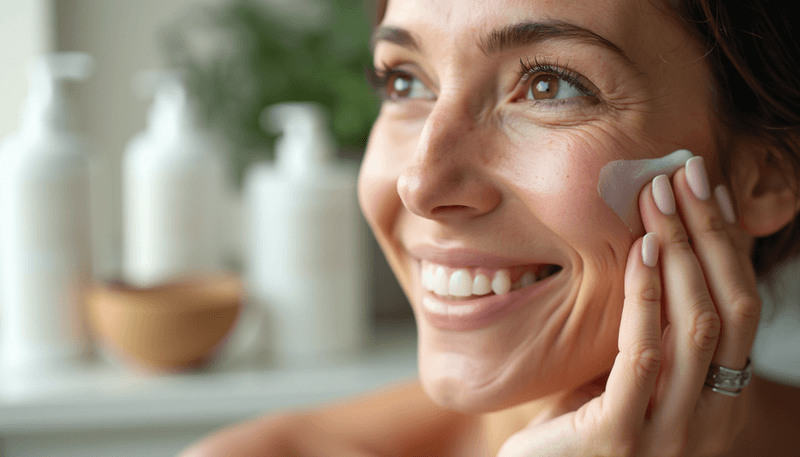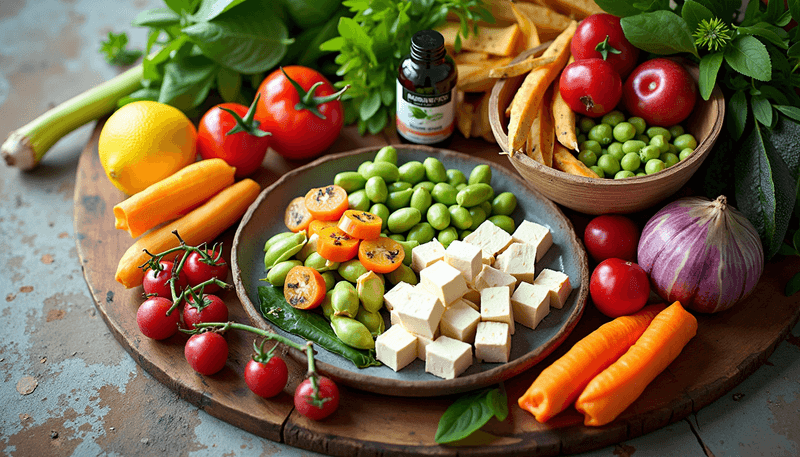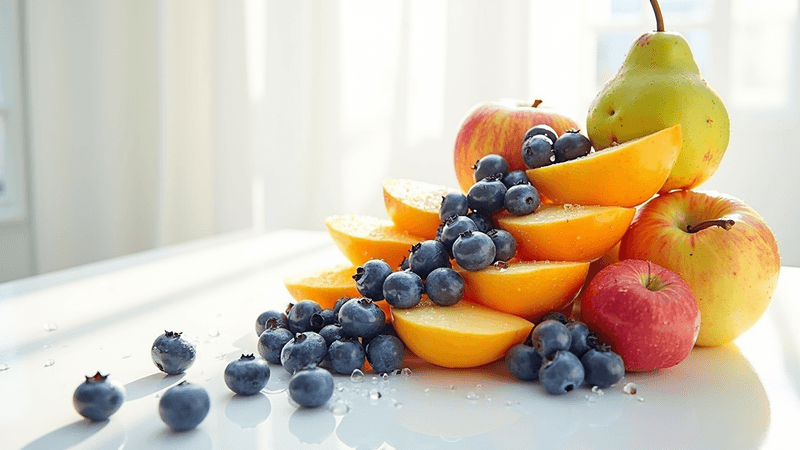Soy and EPO: Secret Weapons for Women

Ladies, gather 'round! We're about to dive into some exciting research that could be a game-changer for your health. As we age, our bodies go through numerous changes, and sometimes it feels like we're on a rollercoaster we didn't sign up for. But what if I told you that two humble ingredients might hold the key to smoother sailing through these changes?
Today, we're exploring the potential benefits of soy isoflavones and evening primrose oil (EPO) for women's health, based on fascinating research by Xuan Qi from the University of Melbourne. This study, published in Highlights in Science, Engineering and Technology, sheds light on how these dietary components could help us age gracefully and manage various women's health issues.
So, grab your favorite cup of tea, and let's unpack these findings together. Trust me, you'll want to stick around for this!
Insight 1: Soy Isoflavones - Your Skin's New Best Friend
Ladies, let's talk about something we all care about - our skin. As we age, our skin loses elasticity, becomes drier, and those pesky wrinkles start to appear. But here's where soy isoflavones enter the scene like a superhero!
Soy isoflavones, particularly genistein and daidzein, have a structure similar to estrogen. This means they can interact with estrogen receptors in our skin, potentially helping to maintain collagen, improve hydration, and even protect against sun damage. It's like having a natural, edible skincare routine!
In the study, postmenopausal women who took a soy protein supplement with added isoflavones saw significant improvements in their skin. We're talking fewer wrinkles, less pigmentation, and better hydration. After 24 weeks, wrinkle severity decreased by 7.1%, and skin hydration increased by a whopping 39-68%!
"Could adding soy to your diet be the secret to that youthful glow we're all after?"
Now, I'm not saying soy is a miracle cure for aging skin. But imagine incorporating more soy into your diet - perhaps swapping your regular milk for soy milk in your morning coffee, or enjoying a tasty tofu stir-fry for dinner. These small changes could potentially contribute to healthier, more radiant skin over time.
Remember, consistency is key. Just like you wouldn't expect miracles from a face cream after one use, the benefits of soy isoflavones come with regular consumption over time. So, why not give it a try? Your skin might just thank you for it!
Insight 2: Soy Isoflavones - Bone Health's Unsung Hero
Now, let's talk about something that's not as visible as our skin, but equally important - our bones. As we age, especially after menopause, our bones can become weaker and more prone to fractures. This is where soy isoflavones step in again, this time as a potential ally for our skeletal health.
Think of your bones as a bustling construction site. Normally, there's a balance between the workers building new bone (osteoblasts) and those breaking down old bone (osteoclasts). But as estrogen levels drop after menopause, it's like the foreman (estrogen) who kept everything in check has left the site. This can lead to more bone breakdown than formation.
Soy isoflavones, our estrogen-like compounds, can potentially step in as substitute foremen. They may help maintain the balance between bone formation and breakdown, keeping our skeletal 'construction site' running smoothly.
The research shows promising results. In a meta-analysis, isoflavone treatments significantly increased bone mineral density (BMD) in postmenopausal women, especially when the intervention lasted 12 months or longer. The effects were particularly noticeable in areas prone to fractures in older adults with osteoporosis, such as the lumbar spine and femoral neck.
"What if the key to stronger bones was sitting in your kitchen cupboard all along?"
So, how can we apply this to our daily lives? Well, it's not about completely overhauling your diet. Small, consistent changes can make a difference. Try incorporating soy-based products into your meals a few times a week. Maybe a soy yogurt parfait for breakfast, or edamame as a snack. Pair this with weight-bearing exercises like walking or dancing, and you're giving your bones a fighting chance against age-related decline.
Remember, it's never too early (or too late) to start thinking about bone health. Your future self will thank you for the strong foundation you're building today!
Insight 3: Evening Primrose Oil - A Natural Ally Against PMS
Alright, ladies, let's talk about something that affects about 85% of us - Premenstrual Syndrome (PMS). Those mood swings, cramps, and general discomfort that come knocking every month? Well, evening primrose oil (EPO) might just be the friendly neighbor that helps chase them away.
EPO is rich in gamma-linolenic acid (GLA), an omega-6 fatty acid that our bodies convert into prostaglandin E1. Think of prostaglandins as the body's internal messaging system. They help regulate inflammation, pain, and even hormone balance. When we're low on these 'good' prostaglandins, PMS symptoms can feel more intense.
In the study, women who took EPO supplements saw significant improvements in their PMS symptoms. After three months, their symptom severity scores dropped from 53.2 to 33.62 - that's a substantial decrease! The placebo group, on the other hand, saw little change.
"Could a little oil from a night-blooming flower be the key to smoother sailing through your monthly cycle?"
So, how can we put this knowledge to use? EPO supplements are widely available, but as always, it's best to consult with your healthcare provider before starting any new supplement regimen. They can help determine the right dosage for you and ensure it won't interact with any medications you might be taking.
But beyond supplements, there are other ways to incorporate the benefits of EPO into your life. You could try using evening primrose oil in your skincare routine - it's known for its moisturizing properties. Or, if you're feeling adventurous, you could even try adding evening primrose seeds to your salads or baked goods for a nutty flavor and potential health boost.
Remember, managing PMS is about more than just addressing the symptoms when they appear. It's about supporting your body all month long. Combine EPO with other lifestyle changes like regular exercise, stress management techniques, and a balanced diet rich in fruits, vegetables, and whole grains. It's like creating a toolkit for your body, with EPO as one of your trusty tools.
As we wrap up our journey through the world of soy isoflavones and evening primrose oil, let's take a moment to reflect on what we've learned. These natural compounds, found in everyday foods and supplements, have shown promising potential in supporting women's health across various stages of life.
From potentially improving skin health and bone density with soy isoflavones to easing PMS symptoms with evening primrose oil, nature seems to have provided us with some powerful allies. But remember, these aren't magic bullets. They work best as part of a holistic approach to health that includes a balanced diet, regular exercise, and good self-care practices.
"How might your life change if you started viewing food not just as fuel, but as a powerful tool for your health and well-being?"
It's important to note that while the research is promising, everyone's body is different. What works wonders for one person might not have the same effect on another. That's why it's crucial to listen to your body and work with healthcare professionals to find the right approach for you.
As we navigate the sometimes turbulent waters of hormonal changes, aging, and women's health issues, it's empowering to know that we have options. Whether it's adding more soy to our diets, considering EPO supplements, or simply being more mindful of how what we eat affects our bodies, we have the power to take an active role in our health.
So, here's my challenge to you: Pick one insight from today's discussion and try incorporating it into your life over the next month. Maybe it's swapping your regular milk for soy milk a few times a week, or talking to your doctor about EPO supplements for PMS. Whatever you choose, pay attention to how you feel and any changes you notice.
Remember, small, consistent changes can lead to big results over time. You're not just taking care of your body for today, but investing in your health for the future. And that, my friends, is truly the secret weapon for aging gracefully and living your best life at any age.
Here's to your health, happiness, and the exciting journey of discovering what works best for you!

Dr. Marcus Anthony Bennett
Dr. Marcus Bennett is a Seattle-based freelance medical writer and consultant specializing in mid-aged women's health. With a background in internal medicine and over a decade of experience in preventive care, he is dedicated to making complex health topics accessible. Dr. Bennett completed his MD at Johns Hopkins School of Medicine and residency at the University of Washington. His empathetic and evidence-based approach combines traditional medical expertise with a focus on health disparities, often incorporating practical lifestyle advice. Known for his clear, engaging communication, Dr. Bennett provides actionable insights to empower his audience.






